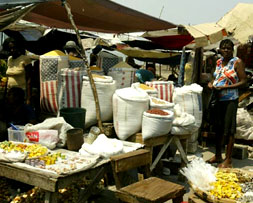 Political upheavals, brutal governments, widespread corruption, environmental catastrophes, trade embargoes, health crises, and the exodus of its skilled workforce have made Haiti the poorest country in the Western Hemisphere, with some 80 percent of the population living in absolute poverty. It is also one of the least industrialized nations in the Americas, and its agrarian economy has been decimated by state inaction, fluctuations in prices on the world market, and extreme deforestation. More than two thirds of Haitians are unemployed. Without any kind of viable governmental policies to spur the economy, in the past few years the private sector has moved in, with peasant associations and microfinance agencies supported by local charities, NGOs, and international aid organizations attempting to aid Haiti’s working population — up to 90 percent of whom are self-employed, mostly as vendors in rural or urban areas. These recent developments represent some possibility of change within the bleak economic landscape.
Political upheavals, brutal governments, widespread corruption, environmental catastrophes, trade embargoes, health crises, and the exodus of its skilled workforce have made Haiti the poorest country in the Western Hemisphere, with some 80 percent of the population living in absolute poverty. It is also one of the least industrialized nations in the Americas, and its agrarian economy has been decimated by state inaction, fluctuations in prices on the world market, and extreme deforestation. More than two thirds of Haitians are unemployed. Without any kind of viable governmental policies to spur the economy, in the past few years the private sector has moved in, with peasant associations and microfinance agencies supported by local charities, NGOs, and international aid organizations attempting to aid Haiti’s working population — up to 90 percent of whom are self-employed, mostly as vendors in rural or urban areas. These recent developments represent some possibility of change within the bleak economic landscape.
FONKOZE (Fondasyon Kole Zepòl, or The Shoulder-to-Shoulder Foundation) (www.fonkoze.org) functions as an alternative bank, tailored especially to the needs of the poor. Its 23 offices throughout Haiti serve 70,000 depositors and 28,000 borrowers (96 percent are women) who would not otherwise have access to the financial services — loans and currency exchange, for example — needed to start or expand small businesses. Tèt Kole Ti Peyizan Ayisyen/Heads Together Small Peasants of Haiti is a coalition of peasant groups formed in 1986; its members — many of them landless sharecroppers — pool resources to provide tool banks, food storage, export services, and agricultural supplies and otherwise fill in for absent state services. Recocarno (Reseau des Cooperatives Cafeieres de la Region Nord) is a network of small coffee-producing cooperatives in northern Haiti; modeled after similar successful programs in Nicaragua, it lets 4,500 farmers sell their crop on the world fair trade coffee market. Founded in 1997, it accounts for as much as 60 percent of northern Haiti’s coffee exports.


